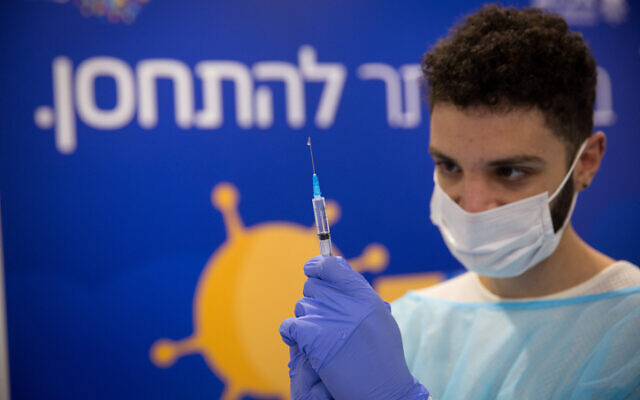FDA adviser: Israel’s fast actions, big data, gave US a ‘window to future of COVID’
Acting chair of FDA vaccine advisory committee hopes Israel’s stellar performance in COVID research will persist in other topics and have ‘continuing effect’ on US health policy
Nathan Jeffay is The Times of Israel's health and science correspondent

Israeli research has given US health policymakers a “window to the future” that helped shape policy on COVID shots and “convinced everybody that boosters were necessary,” a senior American vaccine adviser said on Wednesday.
Prof. Arnold Monto said the US couldn’t pull off the kind of fast decision-making and quick-turnaround, big-data COVID research that Israel achieved, and therefore the Israeli experience became valuable to gauge how different COVID policy steps could play out.
Speaking at an online seminar, Monto, the acting chair of the vaccine advisory committee at America’s Food and Drug Administration, referred specifically to Israel’s embrace of third and fourth shots before other countries. He discussed how this helped experts in the US recognize the value of boosting — which has become a central COVID policy internationally.
Monto also talked at length about Israel’s effective use of real-world data — which is available thanks to the country’s centralized and meticulous digital record-keeping — in order to produce insightful studies.
This should continue, and further inform US policy on non-COVID topics, he said. Monto suggested that if researchers continue on this path, “the unique characteristics of Israel and Israeli healthcare can have a continuing effect on health policy.”
Monto added: “The elements are there, and the COVID emergency showed what can be done when everybody is mobilized to provide the kind of information that has come out of Israel, from skilled scientists.
“What we have to do is to try to keep it going so that we can continue to have Israeli scientists so heavily over-represented in the healthcare journals, and in terms of development of policy.”

Monto was speaking at an online seminar to discuss a recent research paper that showed some 15 percent of the world’s most influential studies on COVID-19 vaccines were written by Israeli scientists. The event was convened by the Israel Journal of Health Policy Research and the Israel National Institute for Health Policy Research.

Monto, a veteran epidemiologist who is based at the University of Michigan School of Public Health, spoke about data and studies from Israeli healthcare providers and hospitals.
“They contributed in different ways to the conclusions that were met,” he said. “In terms of the booster rollout, Israel was ahead of the United States and could draw conclusions about the necessity for boosters not only to prevent mild infections but to prevent severe infections.
“And the issue we had to deal with was the unexpectedly quick waning of immunity in the population, and Israeli data convinced everybody that boosters were necessary, first in the high-risk population, but then in the general population. Because the waning was not only limited to the high-risk population — including older individuals — but in the general population.”
Addressing academics and policymakers convened by the Israel Journal of Health Policy Research and the Israel National Institute for Health Policy Research, he discussed two lessons he felt America learned from watching Israeli research on the pandemic.

One was the relevance of Israel’s data — despite some initial skepticism. “We heard during some of our discussions in the advisory committee, ‘oh, this is not US data.’ But I think we gradually realized that the similarities of the Israeli demographics and also the development of healthcare in Israel gave us a window to the future of what we were going to be seeing in the US where the data developed much more slowly.”
Another lesson was the need to address some of the barriers that slowed access to US data while Israeli researchers could quickly access their country’s data.
“Israel really mobilized the healthcare system to deal with COVID which overcame a lot of the bureaucratic walls that divide some of the entities in Israeli healthcare,” Monto commented. “I think going forward, it is going to be very important to look at how barriers [in the US] have slowed the development of a lot of the observational data which Israel can develop.”









